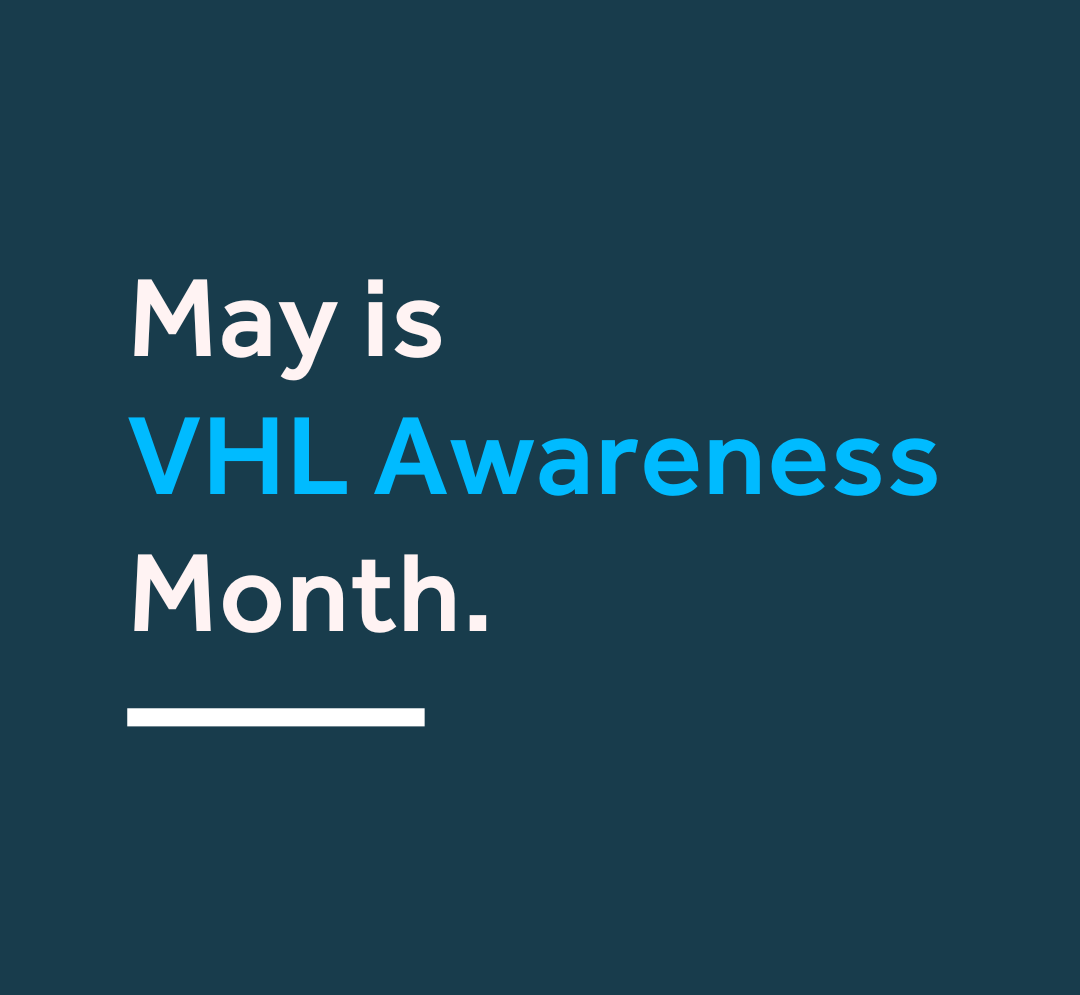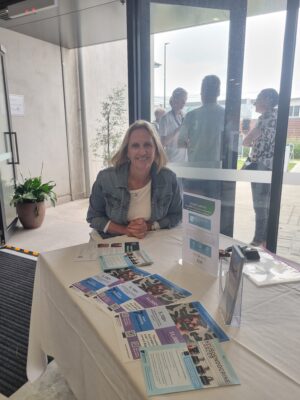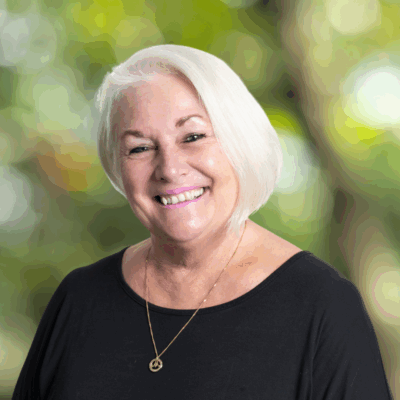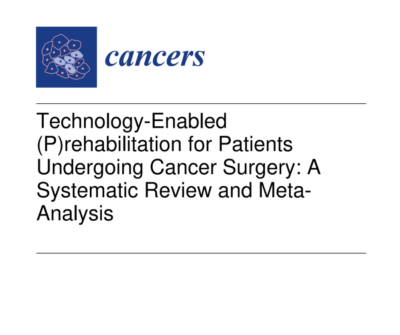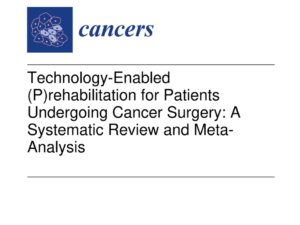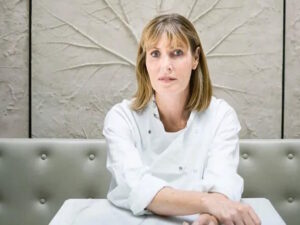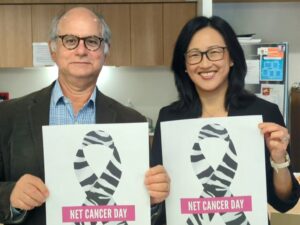May is internationally recognised as Von Hippel-Lindau (VHL) Awareness Month—a time to highlight this rare genetic, and in some case not genetic, condition and the complex cancers it can cause, including certain types of neuroendocrine tumours (NETs). VHL affects around 1 in 36,000 people worldwide and can lead to the development of tumours in multiple organs, including the brain, spinal cord, kidneys, and pancreas. Many of these are classified as neuroendocrine in origin.
In 2024, NECA supported VHL patients Australia-wide and lobbied for the life-changing treatment, Belzutifan to be included on the Pharmaceutical Benefits Scheme (PBS). This significant milestone saw the cost of the treatment, previously $12,000 per month, reduced to just $7.70 for those holding a healthcare card ($31.60 for non-healthcare card holders), making it accessible to more Australians who desperately need it.
This treatment can reduce the growth of debilitating and life-threatening tumours, in many cases, shrink them completely, sparing patients from surgeries that can severely impact their mobility and overall quality of life.
NeuroEndocrine Cancer Australia remains committed to supporting VHL patients and will continue to advocate for improved treatment options and outcomes for all Australians living with rare and complex cancers.
For more information on VHL, you can read our Fact Sheet here.
Feature articles

"Recently, scar tissue ripped the retina off my seeing eye. I went blind in a day. Thankfully it was repaired, but it was frightening and now my eyesight is reduced further. A medicine which reduces the growth and number of these tumours though, could very well save my remaining vision.
Lana - VHL Patient Tweet
“I’m an unusual case in that I’m the only one in my family with the disease,” says Simon. “For most VHL patients, they have parents, siblings, children with the condition. It’s just not possible to pay $12,000 per month, per patient.”
Simon - VHL Patient Tweet

“I can’t imagine watching them wake up from brain surgery. I just can’t. It terrifies me,”
Amelia - VHL Patient and mum of boys with VHL Tweet
"It seems weird to say which is worse or which is more serious, but Fletcher is going to get better and better, whereas every time Levi has a scan there's another punch in the chest. He was 17 when first diagnosed with the cancer," notes Nicky.
Nicky, Mum of VHL Patient, Levi Tweet

“I can’t afford this drug at its current cost, and I don’t know how long it will take – if at all – until it’s added to the PBS. In the meantime, it’s reasonable to think I’ll need another kidney surgery – one that could leave me on permanent dialysis – within the next year. It’s literally a race against time.
Vanessa - VHL Patient, in a race against time Tweet
"It seems weird to say which is worse or which is more serious, but Fletcher is going to get better and better, whereas every time Levi has a scan there's another punch in the chest. He was 17 when first diagnosed with the cancer," notes Nicky.
Nicky, Mum of VHL Patient, Levi Tweet
In the midst of wedding preparations, Tom’s joy turned to worry as a persistent headache plagued him. Doctors discovered a massive brain tumor, leading to a life-saving surgery. However, complete removal was impossible, leaving Tom facing an uncertain future.
Similarly, Simon’s journey took a daunting turn with a diagnosis of Von Hippel-Lindau Syndrome (VHL), resulting in multiple spinal tumours. Traditional surgery offered limited relief until he learned about Belzutifan, a promising new drug.
Unlike surgery, Belzutifan offered a less invasive option for shrinking VHL tumours. However, its high cost of $12,000 per month posed a barrier.
Despite dipping into their mortgage to afford Belzutifan temporarily, the financial burden remained significant for Simon. Yet, his tumours responded remarkably to the treatment, offering hope for improved outcomes.
Simon’s story serves as a poignant reminder of the need for equitable access to life-saving treatments. With each voice added to the cause, the possibility of a brighter future for VHL patients draws closer.
The article highlights the plight of a mother, Amelia, who is battling Von Hippel-Lindau Syndrome (VHL), a rare genetic condition causing tumours in various parts of her body.
Facing a terminal diagnosis, Amelia’s main concern is her children, who also have a 50% chance of inheriting VHL.
Despite knowing about Belzutifan, a new drug offering hope for VHL patients, Amelia cannot afford its hefty cost of $12,000 per month, per child. With the drug potentially becoming affordable at $7.70 per month if added to the Pharmaceutical Benefits Scheme (PBS), Amelia pleads for access, not just for herself but for her children’s future.
Belzutifan represents a lifeline, offering the possibility of improved quality of life and longevity for VHL patients like Amelia.
The article recounts the life-altering accident of 17-year-old Fletcher Crowley, who became paraplegic after a bike stunt gone wrong. Despite the devastating injury, Fletcher’s resilience shines through as he navigates his new reality with determination.
His family, who have faced other challenges including his brother’s battle with cancer, rally around him with hope and support.
Fletcher’s brother Levi was diagnosed with a rare form of cancer called Von Hippel-Lindau syndrome a few years back. Since being diagnosed in 2020, they have discovered multiple tumours in Levi’s brain, spine, retinas, kidneys and pancreas. He has lost sight in one of his eyes and survived brain surgery in 2021.
“It seems weird to say which is worse or which is more serious, but Fletcher is going to get better and better, whereas every time Levi has a scan there’s another punch in the chest. He was 17 when first diagnosed with the cancer,” notes Nicky, the boys’ mum.
“He has nine tumours in his cerebellum, in the brain. He has two on his spine, and one on his kidney. But looking at him, you wouldn’t know anything is different. There’s nothing to see. Whereas Fletcher is like the icon of disability.”
Fletcher’s positive outlook fuels his aspirations, including plans to raise funds for spinal cord research and pursue Paralympic dreams. Despite the obstacles, Fletcher embraces life with a “get silly” attitude, finding purpose and strength in his journey.
The Crowleys have hope that a new drug called Belzutifan could help, as it’s said to reduce VHL tumour growth, though it costs $12,000 a month. Many are now petitioning for the drug to go on the Pharmaceutical Benefits Scheme.

Lana could go blind waiting for the drug Belzutifan to be listed on the PBS in Australia.
“Recently, scar tissue ripped the retina off my seeing eye. I went blind in a day. Thankfully it was repaired, but it was frightening and now my eyesight is reduced further. This wasn’t the first time this has happened to me, either. My eye tumours are always causing havoc.
A medicine which reduces the growth and number of these tumours though, could very well save my remaining vision.
The thought of losing my eyesight on top of being significantly hearing-impaired is terrifying. There’s a reason sensory deprivation is a form of torture.” says Lana.
Vanessa could lose her half remaining kidney waiting for the drug Belzutifan to be listed on the PBS in Australia.
“The surgeon has told me that the next time I have to have surgery, it will be to remove the entire kidney, leaving me on dialysis for the rest of my life,” says Vanessa.
If this drug was added to the PBS and I could start taking it, there is a real chance the tumours would shrink and I could start to have hope for the rest of my life – because I would actually have a life to look forward to,” Vanessa continues.
“It feels so incredibly cruel that for the first time in my life – for many families, the first time in generations of suffering – that there is hope of being able to treat this with medicine, it’s so far out of reach still.”
“I have been told I can’t have children as the risk with the tumours is too high. It’s taken so much from me, but if I could access this drug, it could give me a future,” Vanessa continues.
“I want to be able to think about big events, like having a 40th birthday or maybe travelling or just having the reassurance that I might not have to have a really scary invasive surgery every year. It would change everything.”
The Project, TEN


